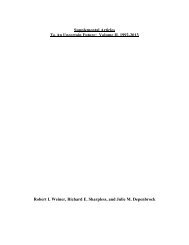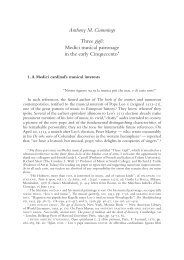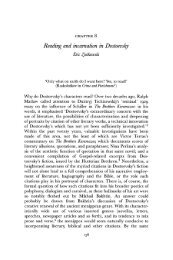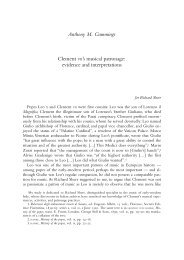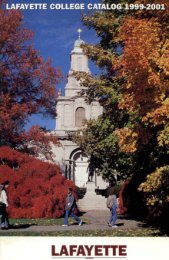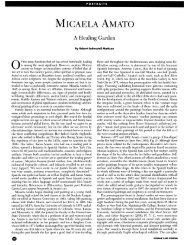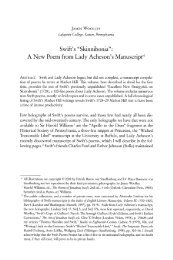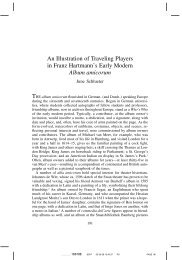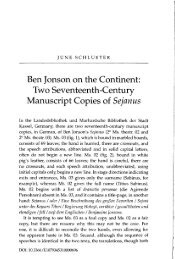Between Religion and Literature: Mircea Eliade ... - Lafayette College
Between Religion and Literature: Mircea Eliade ... - Lafayette College
Between Religion and Literature: Mircea Eliade ... - Lafayette College
You also want an ePaper? Increase the reach of your titles
YUMPU automatically turns print PDFs into web optimized ePapers that Google loves.
<strong>Eliade</strong> <strong>and</strong> Frye<br />
path" that will "lead to some view of the place of literature in civilization as<br />
a whole."2'<br />
Notwithst<strong>and</strong>ing this third concern, <strong>Eliade</strong> <strong>and</strong> Frye also share a tendency<br />
to divorce their subjects of study from the particularities of time or<br />
history <strong>and</strong> to construe them instead in the context of all-embracing,<br />
synthetic structures-such as <strong>Eliade</strong>'s cross-cultural "morphology" of<br />
hierophanies in Patterns <strong>and</strong> his thematic anthology of religious sources<br />
(From Primitives to Zen [1967]) <strong>and</strong> Frye's "synoptic" typologies <strong>and</strong><br />
schemes of biblical <strong>and</strong> Western literary mythoi, "phases," <strong>and</strong> "modes" in<br />
the Anatomy <strong>and</strong> later in The Great Code (1983) <strong>and</strong> its sequel Words with<br />
Power.22 Such holistic systematizations of religious <strong>and</strong> literary phenomena<br />
make the two scholars vulnerable to similar attacks. Anthropologists<br />
criticize <strong>Eliade</strong> for failing to take into sufficient account the historicalcultural<br />
contexts of religious manifestations,23 while certain literary theorists<br />
fault Frye for isolating literature from its relation to life.24 And just as<br />
<strong>Eliade</strong> is accused of making "shamanic" generalizations25 <strong>and</strong> of producing<br />
a "premature" <strong>and</strong> "misplaced" holism,26 so Frye's attempt to reveal<br />
Western literature's "total universe" is disparagingly likened to the apocalyptic<br />
vision of a religious mystic.27<br />
On what grounds might <strong>Eliade</strong> <strong>and</strong> Frye be defended against charges of<br />
ahistoricism <strong>and</strong> of unwarranted generalization? The first charge assumes<br />
that both scholars' structuralism lacks a historical dimension, as does Levi-<br />
Strauss's. But while structure is, by definition, atemporal, <strong>Eliade</strong> explicitly<br />
rejects the structuralism of Levi-Strauss <strong>and</strong> embraces the morphological<br />
method passed on from Goethe to Propp, viewing structure as being-in<br />
Norman Girardot's words-"indissolubly linked with historical experience."28<br />
At the same time, as Paul Ricoeur argues (in terms that might be<br />
21<br />
Frye, Critical Path, p. 14. Compare Northrop Frye, The Myth of Deliverance: Reflections on<br />
Shakespeare's Problem Comedies (Toronto: University of Toronto Press, 1983), p. 9: "The arts <strong>and</strong><br />
sciences thus have two poles, a social pole of origin in the human sense of concern, <strong>and</strong> an<br />
opposite pole in the structure of the art or science itself."<br />
....<br />
22 <strong>Mircea</strong> <strong>Eliade</strong>, From Primitives to Zen: A Thematic Sourcebook of the History of <strong>Religion</strong>s (San<br />
Francisco: Harper & Row, 1977); Northrop Frye, The Great Code: The Bible <strong>and</strong> <strong>Literature</strong> (New<br />
York: Harcourt Brace Jovanovich, 1983); Words with Power: Being a Second Study of "The Bible <strong>and</strong><br />
<strong>Literature</strong>" (New York: Harcourt Brace Jovanovich, 1990).<br />
23 For example, John A. Saliba, "Homo Religiosus" in <strong>Mircea</strong> <strong>Eliade</strong>: An Anthropological Evaluation<br />
(Leiden: Brill, 1976), esp. pp. 114-15.<br />
24 For example, W. K. Wimsatt, "Northrop Frye: Criticism as Myth," in Krieger, ed. (n. 9<br />
above), pp. 75-107.<br />
25 Edmund Leach, "Sermons by a Man on a Ladder," New York Review of Books (October 20,<br />
1966).<br />
26<br />
Gregory D. Alles, "Wach, <strong>Eliade</strong>, <strong>and</strong> the Critique from Totality," Numen 35 (1988): 120.<br />
27 Walter Sutton, Modern American Criticism (Englewood Cliffs, N.J.: Prentice-Hall, 1963), p.<br />
258.<br />
28 Norman Girardot, "Introduction," Imagination <strong>and</strong> Meaning: The Scholarly <strong>and</strong> Literary<br />
Worlds of <strong>Mircea</strong> <strong>Eliade</strong>, ed. Norman Girardot <strong>and</strong> Mac Linscott Ricketts (New York: Seabury,<br />
503



